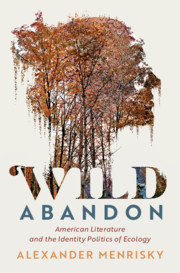Book contents
- Wild Abandon
- Cambridge Studies in American Literature and Culture
- Wild Abandon
- Copyright page
- Contents
- Acknowledgments
- Introduction Modern Environmentalism’s Identity Politics
- Chapter 1 The Ecological Alternative
- Chapter 2 The Entheogenic Landscape
- Chapter 3 The Universal Wilderness
- Chapter 4 The Essential Ecosystem
- Chapter 5 The Death of the Supertramp
- Conclusion Ecological Consistency
- Notes
- Bibliography
- Index
- Recent Books in This Series (continued from page ii)
Introduction - Modern Environmentalism’s Identity Politics
Published online by Cambridge University Press: 26 November 2020
- Wild Abandon
- Cambridge Studies in American Literature and Culture
- Wild Abandon
- Copyright page
- Contents
- Acknowledgments
- Introduction Modern Environmentalism’s Identity Politics
- Chapter 1 The Ecological Alternative
- Chapter 2 The Entheogenic Landscape
- Chapter 3 The Universal Wilderness
- Chapter 4 The Essential Ecosystem
- Chapter 5 The Death of the Supertramp
- Conclusion Ecological Consistency
- Notes
- Bibliography
- Index
- Recent Books in This Series (continued from page ii)
Summary
Wild Abandon’s introduction establishes the book’s methodology, introduces key terms (identity politics of ecology, ecological authenticity, and dissolution), and traces the origins of environmentalist identity politics to the American New Left. Movement radicals sought “natural” alternatives to the “artificial” postwar liberal order, often articulating this opposition in terms of repression and elevating self-liberation to the forefront of their program. However, ecology’s simultaneous political debut, and the field’s attention to the biophysical interrelationships that both constitute and undermine individuals, challenged selfhood’s apparent sanctity. For some radicals, ecology suggested that self-identity merely constitutes yet another repressive formation to discard. Because selfhood is socially constructed, the ecosystem as a whole comprises one’s most essential identity. This appeal to ecological rather than personal authenticity constitutes the identity politics of ecology, which is less a movement than a rhetorical tendency. Conversations between adherents to this perspective and a variety of other identity positions play out in literary texts from the 1960s to the present.
Keywords
- Type
- Chapter
- Information
- Wild AbandonAmerican Literature and the Identity Politics of Ecology, pp. 1 - 26Publisher: Cambridge University PressPrint publication year: 2020

